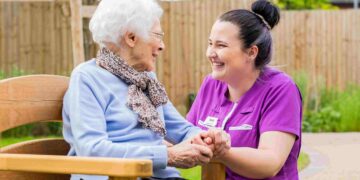As temperatures drop it’s really important for us as friends, family and caregivers to really think about how we can support the elderly during the winter months. As homecare specialists, we often see Clients making decisions which have an adverse impact on their health, including turning the heating off to save money, not wearing warm enough clothes, or simply getting lonely and feeling isolated as they days get shorter, and they can’t get out so much. Here are some tips on how you can help.
Tip 1: Plan ahead.
As family members and caregivers it’s our responsibility to plan ahead for our loved ones. Think about the types of support they may need over the winter months, and how we can support them. It’s important to think about things like food. Can we get food delivered, are there long-lasting items, meals that can be cooked from frozen? Ask them about their favourite warm comfort foods, and soups etc which are great on a cold day. Nutrition and hydration is just as important in the winter.
Tip 2: Dress appropriately.
We also need to think ahead and pick out clothes that are appropriate. Dressing in warm layers that can be removed if you get too hot is best, including nice warm socks and slippers when indoors. If going outside, add layers and think about footwear – nice strong shoes that won’t slip so much if it’s wet or icy. And wear a hat, scarf & gloves too.
Sometimes, people living with Dementia and Alzheimer’s may forget, and go outside not wrapped up against the harsh winter weather. In bad cases of confusion, they may be found wandering outside in just their PJs or a nightie. Helping folk stick to a routine of getting dressed each day with the best outfit for the weather can be really helpful.
Tip 3: Fight Winter depression
We have a real problem with social isolation in the UK, and especially with the elderly (which has got worse during the ongoing Covid pandemic). It’s inevitable as it gets colder this will get worse as we don’t go out so much.
So, what can we do to help with that? Perhaps arranging to call in to see an elderly relative or neighbour at some point earlier in the evening when it has got colder and dark, and they may otherwise be tempted to get into bed at 5 or 6pm which is much earlier than normal. If you can’t physically visit, perhaps a video call or even just a phone conversation at this time of day could make a big difference. At Right at Home we see every day the impact that a regular visitor and the chance for a natter can have to our client’s well-being,
Tip 4 Heating.
We often find that clients find adjusting the heating a challenge – in which case our team is asked to check thermostats to help keep the house temperature comfortable for that person (eg a minimum of 20ºC). Some people place items too close to the fire or heater, making it hazardous. So, if you are looking after someone, or simply calling to have a chat, do check the heating is adequate, and it is safe in the home. A related tip: have extra blankets to hand so if it does get cold, it’s easier to keep warm.
Tip 5 Keep your Spirits up
Just because the days are shorter doesn’t mean it’s bedtime in the afternoon, and yet if its dark and you’ve lost track of time that’s what may well happen. So, if you make a regular call to an elderly friend or relative, think about timing it to remind your gran or grandad that it’s only 4:30pm (too early for bed), and point out if there’s a good TV programme – a quiz show, movie or nature program – that they might enjoy.
Tip 6 Flu (& Covid Booster) jabs
Finally, encourage your elderly friends and family to get the jabs, so they can benefit from the protection they provide. Remind them that it’s free and think about arranging to take them to the GP surgery or local pharmacy so they can have their jabs ready for the peak flu season, and for extra protection against the dangerous Covid virus.
Kevin Lancaster
Right at Home Reading & Wokingham District

















































